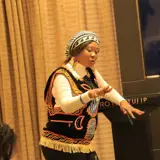About Our Courses
Course Benefits
Our courses are designed to empower and equip individuals with comprehensive knowledge and practical skills to combat human trafficking in Africa. Through a diverse range of training topics we focus on fostering leadership, providing trauma-informed care, advocating for legal and policy changes, promoting sustainable livelihoods, building collaborative networks, raising awareness, and addressing the intersections between climate change and human trafficking.
Key Features
Leadership Development: Empowering survivors to become leaders in their communities and beyond. This includes training in public speaking, policy advocacy, and community mobilization.
Trauma-Informed Care: Providing specialized training on trauma-informed practices to ensure that all interventions are compassionate and supportive of survivors' mental and emotional well-being. Special emphasis is given to Afro-centric trauma-informed care, recognizing and addressing the unique cultural contexts of African survivors.
Legal and Policy Advocacy: Equipping participants with the knowledge to navigate and influence legal and policy frameworks that affect human trafficking. This includes understanding international laws, national legislation, and grassroots advocacy techniques focused on human trafficking laws and policies.
Sustainable Livelihoods: Offering training in entrepreneurship, vocational skills, and economic empowerment to help survivors build independent and sustainable futures. This includes financial literacy training to ensure survivors can manage and grow their financial resources effectively.
Collaborative Networks: Building strong partnerships with various stakeholders to create a robust support network. This includes facilitating dialogues and collaborations between survivors, government agencies, NGOs, academia, and the private sector.
Awareness and Education: Conducting outreach and education campaigns to raise awareness about human trafficking, its impacts, and the importance of survivor-led initiatives.
Climate Change and Human Trafficking: Addressing the intersection of climate change and human trafficking, providing insights into how environmental factors can exacerbate vulnerabilities and contribute to trafficking.












